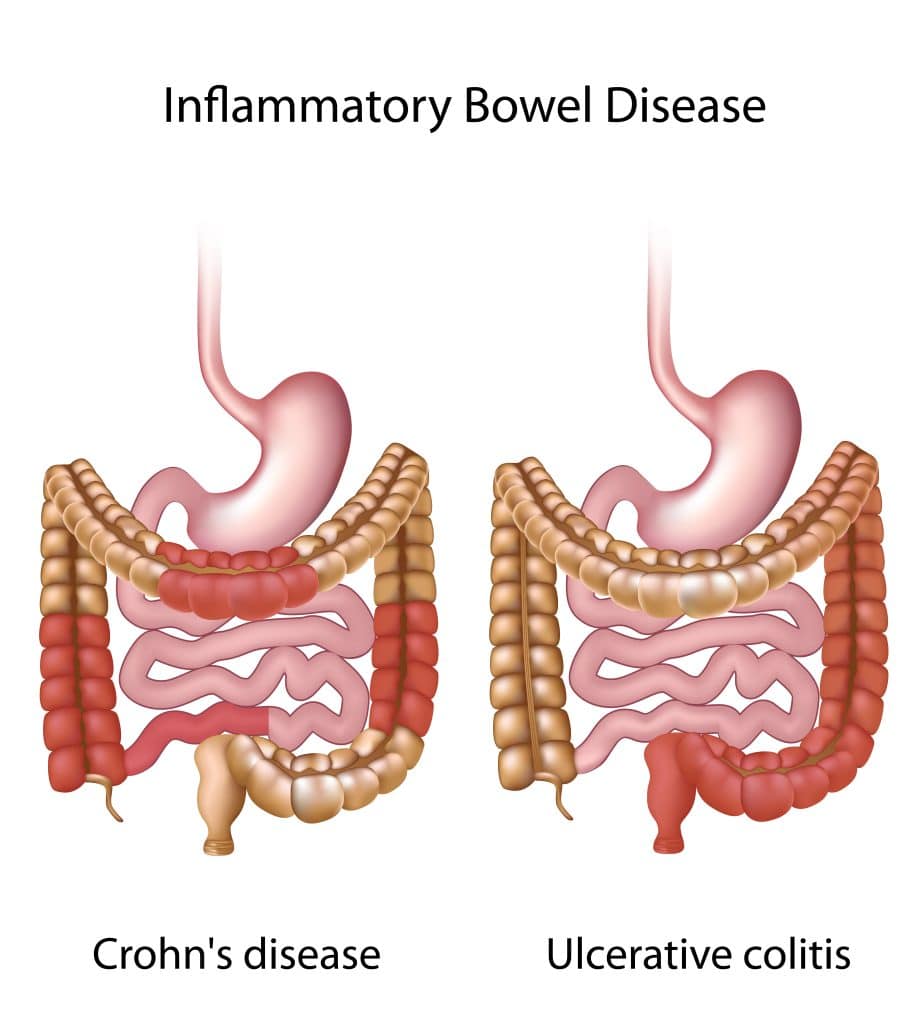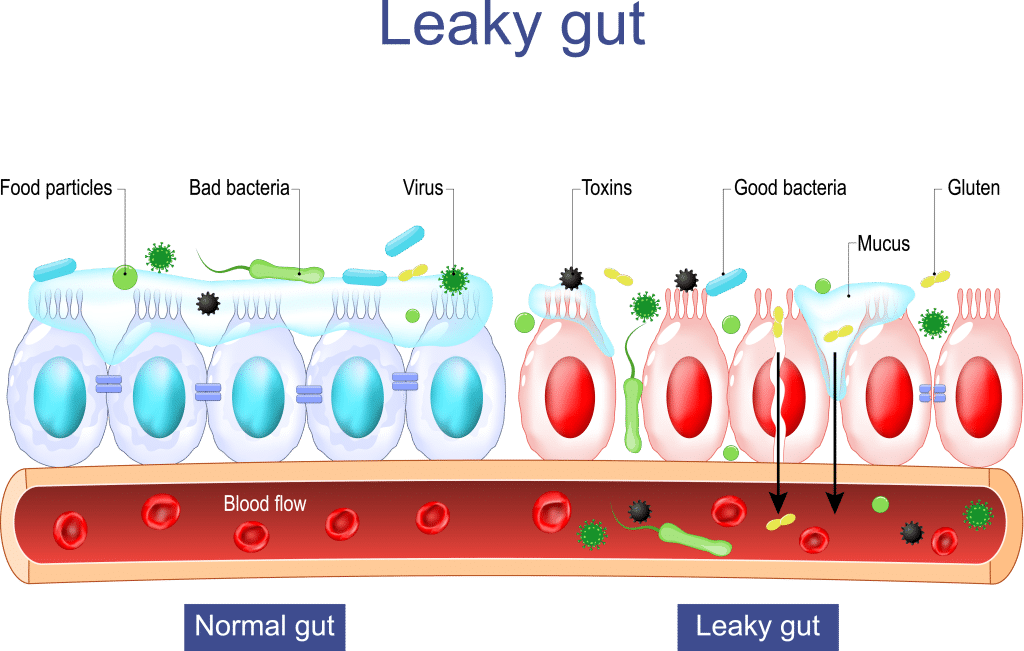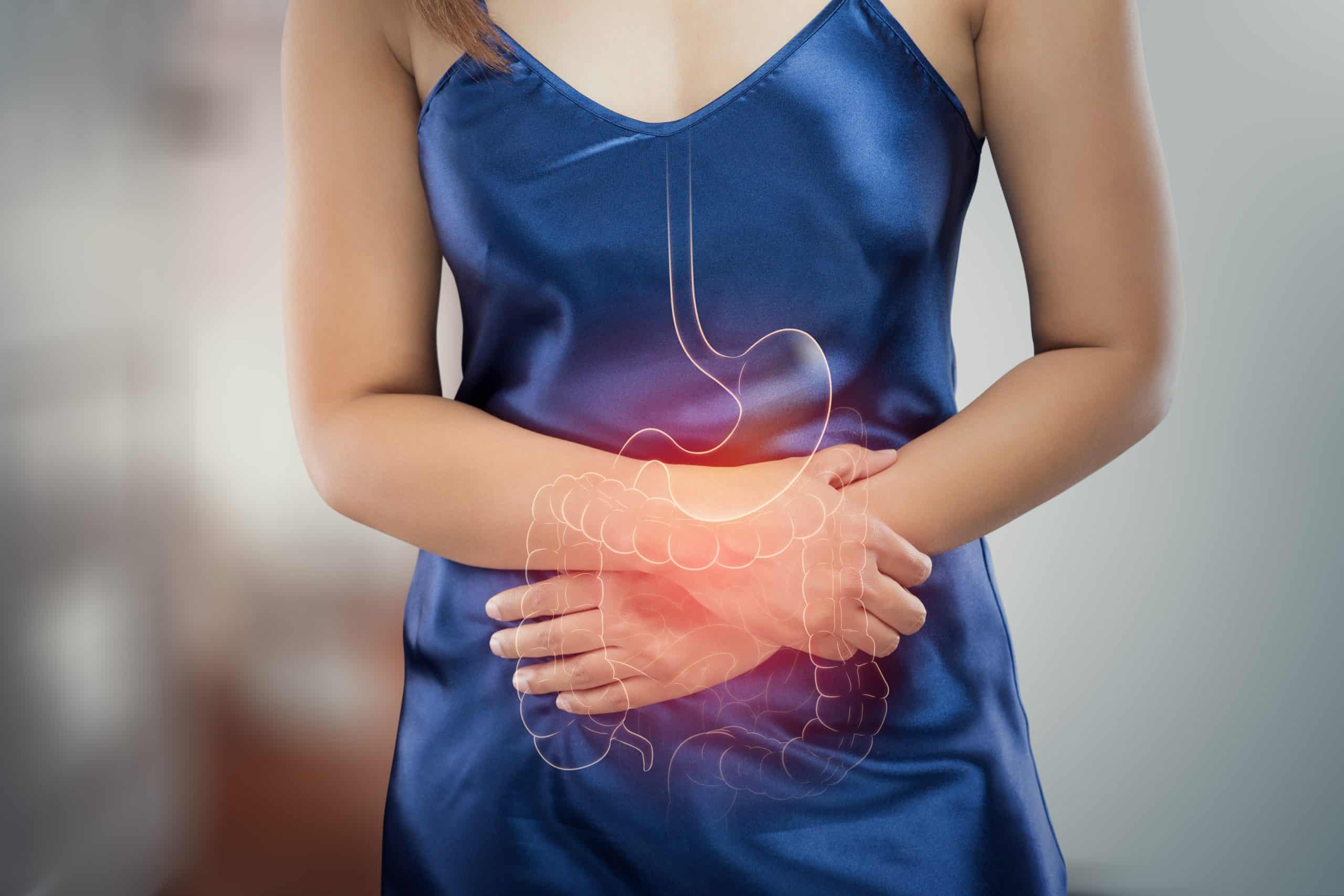What Causes Inflammatory Bowel Disease And How To Treat It
Inflammation of the gastrointestinal tract is what causes inflammatory bowel disease (IBD). The two main forms of IBD are Crohn’s disease and ulcerative colitis. These conditions occur when the body’s immune system mistakenly reacts to its own healthy cells, causing an inflammatory response to occur in the digestive tract. This inflammation can lead to a variety of symptoms, including abdominal pain, diarrhea, and weight loss.1
Approximately 1.6 million Americans are affected by inflammatory bowel disease.2 Exactly what causes inflammatory bowel disease remains largely unknown, but like other autoimmune conditions, it is a combination of genetic and environmental factors.
What Causes Inflammatory Bowel Disease – Chron’s Disease
Crohn’s disease is characterized by inflammation that occurs in patches throughout the digestive tract, including the small and large intestines. These patches can affect multiple layers of tissue in the intestinal lining and may not be confined to a single area of the tract. The damage caused by Crohn’s disease can vary from person to person, but it often affects the entire tract instead of just one area. Symptoms can range from mild to severe depending on the extent of the inflammation and damage.3
What Causes Inflammatory Bowel Disease – Ulcerative Colitis
Ulcerative colitis is a condition that affects only the large intestine, or colon. Typically, it causes inflammation and pain throughout the entire length of the colon. In some cases, however, it may only cause inflammation in the innermost layer of the colon’s lining.4

Symptoms Of IBD
Common symptoms of inflammatory bowel disease include diarrhea that persists for a prolonged period, abdominal pain and cramping, rectal bleeding or bloody stools, loss of appetite, unintended weight loss, fatigue or lack of energy, fever, and feeling an urgent need to have a bowel movement. These may vary depending on the diagnosis and severity of the condition. Many people with IBD can experience long periods of remission where they may have few to no symptoms.5
Genetic Factors Are Part Of What Causes Inflammatory Bowel Disease
Genetic factors play a role in what causes inflammatory bowel disease. Genes involved in the regulation of the immune system may make individuals more susceptible to IBD. Specifically, variations in the NOD2 gene have been linked to Crohn’s disease6 and the ATG16L1 gene has been identified as a susceptibility locus for ulcerative colitis.7
Environmental Factors Are Part Of What Causes Inflammatory Bowel Disease
Environmental factors also play a role in what causes inflammatory bowel disease. These environmental factors may include living in a modern industrialized society, lifestyle choices such as diet and exercise, antibiotic use, and exposure to certain chemical pollutants or infections.
The Link Between IBD And Childhood Obesity
Being overweight is a major risk factor for developing inflammatory bowel disease. Individuals who are overweight are more likely to develop IBD than those of normal body weight. Studies suggest that this may be due to changes in the gut microbiome, increased inflammation, and altered immune function.
People who are overweight are more likely to suffer from long-term health complications associated with IBD. It is important for people with IBD to maintain a healthy weight in order to reduce the risk of developing further complications.8
Read more about how to lose fat and keep it off.

The Link Between IBD And Childhood Antibiotic Use
Recent studies have demonstrated a potential link between childhood antibiotic use and the development of inflammatory bowel disease later in life. These findings suggest that antibiotic use during childhood may disrupt the normal balance of bacteria and other microorganisms in the gut, leading to a heightened risk of developing IBD. This imbalance is known as dysbiosis, which can trigger an inflammatory response in the intestinal tract and contribute to IBD.9
The Western Diet Causes Inflammatory Bowel Disease
People who live in modernized countries are more likely to develop IBD than those living in less industrialized countries.10 Western dietary choices increase the risk of developing IBD.11
Heavy Metals And Pesticides Are Linked To IBD
Exposure to certain chemicals and heavy metals can play a role in triggering IBD. Specifically, environmental toxins such as cadmium, lead, mercury, arsenic, and pesticides contribute to IBD.12 13 14 15 These chemicals cause inflammation in the intestines which can trigger IBD symptoms. These environmental toxins are hard to avoid and accumulate in the body over time.
Read more about the toxic effects of glyphosate, a commonly used herbicide found in Roundup.
Heavy Metals And The Link To Autoimmune Conditions
Heavy metals, such as lead, mercury, and arsenic, can cause a wide range of autoimmune conditions. Heavy metals disrupt normal system functioning by causing oxidative stress which leads to chronic inflammation. This inflammatory state leads to an overactive immune system that attacks healthy tissue instead of just attacking foreign invaders. Essentially, inflammation is what causes inflammatory bowel disease and other autoimmune conditions such as rheumatoid arthritis, lupus, Crohn’s disease, and celiac disease.16 17 18
Read more about what causes autoimmune conditions.

Harmful Gut Bacteria And Viruses Linked With IBD
Certain bacteria play a role in the development of IBD. Specifically, Clostridium difficile has been linked to IBD.19 Clostridium difficile, commonly referred to as C. difficile or C. diff, is a type of bacteria that causes an array of symptoms ranging from mild diarrhea to potentially fatal inflammation of the colon.20
Studies have also indicated that Adenovirus, Enteric adenoviruses, Astrovirus, Norovirus, and Cytomegalovirus play a role in triggering IBD symptoms.21
Intestinal Barrier Dysfunction And IBD
Intestinal barrier dysfunction has been noted before the diagnosis of IBD. Barrier dysfunction is caused by an imbalance between pro-inflammatory and anti-inflammatory elements within the intestinal microenvironment. Additionally, dysregulation of proteins involved in epithelial cell adhesion can lead to increased permeability of the intestinal barrier and allow for the passage of antigens, bacteria, and other irritants that would otherwise be kept out.
In addition to this direct impact on barrier integrity, dysbiosis has been linked with the development of IBD due to its ability to trigger an inflammatory cascade. Dysbiosis can be caused by a variety of factors including diet, antibiotics, stress, and environmental changes.
This dysregulated microbiome leads to increased production of pro-inflammatory cytokines that activate the adaptive immune response. Furthermore, this process can create an environment in which bacteria, viruses, and fungi can more easily penetrate the intestinal barrier.22

What Causes Inflammatory Bowel Disease – Gut Microbiota
Gut microbiota is a key player in the pathogenesis of intestinal inflammation. The composition and diversity of gut microbiota are profoundly affected by dietary habits, environmental factors, and other extrinsic stressors.
Diet is one of the most important determinants for the composition and function of the gut microbiome, influencing both host physiology and the microbial community. A diet high in unhealthy fats, sugar, and processed foods is associated with an increased risk of ulcerative colitis and Crohn’s disease.23
IBD Treatments – Common Medications
When it comes to treating IBD, there are a few common medications that doctors may prescribe. Common drugs used to treat IBD include corticosteroids, immunomodulators, biologic agents, and antidiarrheal medications.1 As with most pharmaceutical drugs, there are many common side effects associated with these medications.
How To Treat IBD – Improve Diet, Vitamin D, Heavy Metal Detox
Alternative therapies and lifestyle strategies may be beneficial in relieving symptoms associated with Crohn’s disease and ulcerative colitis.
Diet As A Way To Treat IBD
Consuming a healthy diet like my Cellular Healing Diet is one of the best ways to treat symptoms of IBD. The Cellular Healing Diet focuses on consuming healthy fats like those found in grass-fed meat, fish, olive oil, and coconut oil. Combined with a moderate amount of protein and limited carbohydrates, the Cellular Healing Diet reduces overall inflammation while strengthening cellular membranes.
Read more about my Cellular Healing Diet.

IBD And Vitamin D
When it comes to inflammatory bowel disease, research has found that vitamin D may play an important protective role. Vitamin D works by aiding in the absorption of calcium and phosphorus, which are essential nutrients for good health.
Additionally, vitamin D helps regulate the immune system, which is responsible for fighting off infections and other diseases. Studies have shown that people with IBD have lower levels of vitamin D than those without the condition, so increasing intake could provide protection from further complications.24
Read more about the link between Vitamin D and autoimmune conditions.

Heavy Metal Detox As A Way To Treat IBD
Removing heavy metals is the key to down-regulating inflammation and is at the core of any treatment aimed at reducing and eliminating autoimmune conditions. While not a quick protocol, by using oral chelation agents, we can remove heavy metals from the body and allow true healing to begin.
Read more about my heavy metal detox protocol.
What Causes Inflammatory Bowel Disease And How To Treat It
Now that you know what causes inflammatory bowel disease, a combination of genetics and environmental factors, choose lifestyle choices that reduce the causes of intestinal inflammation. Specifically, consume a healthy diet, get enough vitamin D, ideally through sun exposure and food sources, and reduce exposure to heavy metals and other toxins. Additionally, take part in a heavy metal detox chelation protocol that targets the cause of IBD and other autoimmune conditions at the core.
Read more about Irritable Bowel Syndrome.
References
1 What is inflammatory bowel disease (IBD)? | IBD. (2022). https://www.cdc.gov/ibd/what-is-ibd.htm
2 Shivashankar R, Tremaine WJ, Harmsen WS, Loftus EV Jr. Incidence and Prevalence of Crohn’s Disease and Ulcerative Colitis in Olmsted County, Minnesota From 1970 Through 2010. Clin Gastroenterol Hepatol. 2017 Jun;15(6):857-863. doi: 10.1016/j.cgh.2016.10.039. Epub 2016 Nov 14. PMID: 27856364; PMCID: PMC5429988.
3 Crohn’s disease – Symptoms and causes – Mayo Clinic. (2022, August 6). Mayo Clinic. https://www.mayoclinic.org/diseases-conditions/crohns-disease/symptoms-causes/syc-20353304
4 Ulcerative colitis – Symptoms and causes – Mayo Clinic. (2022, September 16). Mayo Clinic. https://www.mayoclinic.org/diseases-conditions/ulcerative-colitis/symptoms-causes/syc-20353326
5 Inflammatory Bowel Disease: Symptoms and Treatment. (1999, December 31). WebMD. https://www.webmd.com/ibd-crohns-disease/inflammatory-bowel-syndrome
6 Yamamoto S, Ma X. Role of Nod2 in the development of Crohn’s disease. Microbes Infect. 2009 Oct;11(12):912-8. doi: 10.1016/j.micinf.2009.06.005. Epub 2009 Jun 30. PMID: 19573617; PMCID: PMC2924159.
7 Tsianos VE, Kostoulas C, Gazouli M, Frillingos S, Georgiou I, Christodoulou DK, Katsanos KH, Tsianos EV. ATG16L1 T300A polymorphism is associated with Crohn’s disease in a Northwest Greek cohort, but ECM1 T130M and G290S polymorphisms are not associated with ulcerative colitis. Ann Gastroenterol. 2020 Jan-Feb;33(1):38-44. doi: 10.20524/aog.2019.0434. Epub 2019 Nov 21. PMID: 31892796; PMCID: PMC6928472.
8 Lautenschlager, S.A., Barry, M.P., Rogler, G. et al. Lifestyle factors associated with inflammatory bowel disease: data from the Swiss IBD cohort study. BMC Gastroenterol 23, 71 (2023). https://doi.org/10.1186/s12876-023-02692-9
9 Ledder O. Antibiotics in inflammatory bowel diseases: do we know what we’re doing? Transl Pediatr. 2019 Jan;8(1):42-55. doi: 10.21037/tp.2018.11.02. PMID: 30881898; PMCID: PMC6382505.
10 Loftus EV Jr. Clinical epidemiology of inflammatory bowel disease: Incidence, prevalence, and environmental influences. Gastroenterology. 2004 May;126(6):1504-17. doi: 10.1053/j.gastro.2004.01.063. PMID: 15168363.
11 M’Koma AE. Inflammatory bowel disease: an expanding global health problem. Clin Med Insights Gastroenterol. 2013 Aug 14;6:33-47. doi: 10.4137/CGast.S12731. PMID: 24833941; PMCID: PMC4020403.
12 Bist P, Choudhary S. Impact of Heavy Metal Toxicity on the Gut Microbiota and Its Relationship with Metabolites and Future Probiotics Strategy: a Review. Biol Trace Elem Res. 2022 Dec;200(12):5328-5350. doi: 10.1007/s12011-021-03092-4. Epub 2022 Jan 7. PMID: 34994948.
13 Amerikanou C, Karavoltsos S, Gioxari A, Tagkouli D, Sakellari A, Papada E, Kalogeropoulos N, Forbes A, Kaliora AC. Clinical and inflammatory biomarkers of inflammatory bowel diseases are linked to plasma trace elements and toxic metals; new insights into an old concept. Front Nutr. 2022 Dec 8;9:997356. doi: 10.3389/fnut.2022.997356. PMID: 36570124; PMCID: PMC9780073.
14 Lima C, Falcão MAP, Rosa JGS, Disner GR, Lopes-Ferreira M. Pesticides and Their Impairing Effects on Epithelial Barrier Integrity, Dysbiosis, Disruption of the AhR Signaling Pathway and Development of Immune-Mediated Inflammatory Diseases. Int J Mol Sci. 2022 Oct 17;23(20):12402. doi: 10.3390/ijms232012402. PMID: 36293259; PMCID: PMC9604036.
15 Huang HM, Pai MH, Yeh SL, Hou YC. Dietary exposure to chlorpyrifos inhibits the polarization of regulatory T cells in C57BL/6 mice with dextran sulfate sodium-induced colitis. Arch Toxicol. 2020 Jan;94(1):141-150. doi: 10.1007/s00204-019-02615-2. Epub 2019 Dec 5. PMID: 31807802.
16 Valko, M., Morris, H., & Cronin, M. T. (2005). Metals, toxicity and oxidative stress. Current medicinal chemistry, 12(10), 1161–1208. https://doi.org/10.2174/0929867053764635
17 Cortés, S., Zúñiga-Venegas, L., Pancetti, F., Covarrubias, A., Ramírez-Santana, M., Adaros, H., & Muñoz, L. (2021). A Positive Relationship between Exposure to Heavy Metals and Development of Chronic Diseases: A Case Study from Chile. International journal of environmental research and public health, 18(4), 1419. https://doi.org/10.3390/ijerph18041419
18 Lehmann, I., Sack, U., & Lehmann, J. (2011). Metal ions affecting the immune system. Metal ions in life sciences, 8, 157–185.
19 D’Aoust J, Battat R, Bessissow T. Management of inflammatory bowel disease with Clostridium difficile infection. World J Gastroenterol. 2017 Jul 21;23(27):4986-5003. doi: 10.3748/wjg.v23.i27.4986. PMID: 28785153; PMCID: PMC5526769.
20 Vitikainen K, Haapamäki J, Färkkilä M, Anttila VJ, Arkkila P. Clostridium difficile infection in patients with inflammatory bowel disease: a case control study. Scand J Gastroenterol. 2018 Aug;53(8):947-951. doi: 10.1080/00365521.2018.1492012. Epub 2018 Jul 25. PMID: 30041549.
21 Tarris G, de Rougemont A, Charkaoui M, Michiels C, Martin L, Belliot G. Enteric Viruses and Inflammatory Bowel Disease. Viruses. 2021 Jan 13;13(1):104. doi: 10.3390/v13010104. PMID: 33451106; PMCID: PMC7828589.
22 Mehandru, S., Colombel, JF. The intestinal barrier, an arbitrator turned provocateur in IBD. Nat Rev Gastroenterol Hepatol 18, 83–84 (2021). https://doi.org/10.1038/s41575-020-00399-w
23 Lobionda S, Sittipo P, Kwon HY, Lee YK. The Role of Gut Microbiota in Intestinal Inflammation with Respect to Diet and Extrinsic Stressors. Microorganisms. 2019 Aug 19;7(8):271. doi: 10.3390/microorganisms7080271. PMID: 31430948; PMCID: PMC6722800.
24 Parizadeh SM, Jafarzadeh-Esfehani R, Hassanian SM, Mottaghi-Moghaddam A, Ghazaghi A, Ghandehari M, Alizade-Noghani M, Khazaei M, Ghayour-Mobarhan M, Ferns GA, Parizadeh SMR, Avan A. Vitamin D in inflammatory bowel disease: From biology to clinical implications. Complement Ther Med. 2019 Dec;47:102189. doi: 10.1016/j.ctim.2019.08.023. Epub 2019 Aug 29. PMID: 31779998.




